Riding for The Pony
Every year, we provide radio support for the Pony Express Re-Ride. This year's Re-Ride starts in Sacramento, CA on June 7th and ends in St. Joseph, MO on the 17th. All photographs by the author.
Every June it happens, galloping under the full moon between St. Joseph, MO and Sacramento, CA in ten days. It shows itself to a few lucky who manage to be at the right place at the exact moment it appears for a few minutes. Then it vanishes like a ghost.
It is the Pony Express Re-Ride.
The mission through Nevada sounds simple: Carry the U.S. Mail on horseback four hundred miles once a year. It’s all part of a grand tradition they call riding for The Pony. As Jim Hillman, former officer of the Nevada Division, puts it “we ride out of respect for the courage of those Pony Express riders of 1860.”
In those days, hundreds of sturdy, young men as young as thirteen, preferably orphans, rode thousands of miles through inclement weather, harsh terrain, and hostile tribal territory. Eighteen months later telegraph lines rendered the service obsolete. Of all Old West exploits, however, the Pony Express has become iconic, inspiring equestrians to honor them once a year by riding as close to the original route as possible.
In Nevada, it was the height of the Paiute Wars. Sometimes, a rider would finish a twenty-mile stretch only to find the station burning, the people dead, and horses gone. So he would have to ride on. Bill Haslam endured such an experience, becoming the legendary Pony Bob to every modern-day rider.
For those who wait hours to see the riders, there are redundant systems to tell them the progress of the Pony within as little as ten minutes. A spot beacon is enclosed in the mochila that beams the GPS coordinates via satellite to a map on the National Association's website. Since the annual Re-Ride was established in 1980, amateur radio operators (hams) have kept track of the riders' progress to make sure they get to the next transfer point within the expected time. Some camp out on mountaintops to relay information from hams following behind the riders as well as those camped where the transfers of the mochila take place.
Stories from The Pony
The importance of these redundant systems became abundantly clear as the Pony approached the Nevada/California border one year. As a few spectators waited at Stateline near South Lake Tahoe, the anticipation rose to fever pitch. The Nevada riders had not only made up a two-hour delay that Utah caused, but they were thrilled to pass the mochila over to California with two additional hours to spare.
Then the horrible news came over David Granish's two-meter radio: 90-year-old Bob Moore fell off his horse. His riding partner, Petra Keller, was able to help Moore get to his feet, but the horse with the mochila galloped off in one direction while the bear that frightened him retreated in the opposite direction.
Those at Stateline listened for news on Granish's radio as if it were a play-by-play event. Even the El Dorado County Sheriff's Dept. was monitoring ham communications. But where was the horse? Lost in the woods above Lake Tahoe, the horse and that important mochila must be found as soon as possible. If you'll pardon the expression, it was crunch time.
SIERA ham Bob Williams received coordinates of the last spot beacon's location from field operator, Ben Echevarria, and checked them against two maps on the NPEA's website. He realized that the horse had stopped "in somebody's front yard" off Kingsbury Grade.
Using Williams' and Echevarria's information, Search and Rescue quickly retrieved the mochila and delivered it to California Pony rider, Jerry Bestpitch, who passed the Stateline exchange point ten minutes late. Disappointing, but at least the mochila was found and Moore was soon released from the hospital with only bumps, bruises, and a small laceration.
It's an Adventure, Not a Job
While parts of the Nevada trail run parallel to Highway 50, "The Loneliest Highway in the World," large portions meander over remote valleys and mountains far from asphalt. One year, the Pony was delayed because of the Equine Herpes One virus. That placed the event during the new moon instead of the full moon, making it difficult for those riding at night.
Often, the ham is the ad hoc 911 or roadside assistance. A rider got an assist on his eight-mile section from a ham who followed him with headlights on so he could gallop in traditional form.
Except for a rider breaking a leg in Nebraska, the 2017 Re-Ride had gone rather smoothly. Then the Pony arrived in Nevada the same time as a June snowstorm that laid several inches of snow across the state. By this time, nighttime had fallen upon the eastern sections.
Ken Head, of Placerville, CA, started following the Pony north of Ely, NV. According to Head's wild storytelling, which was verifiable by the condition of his Jeep, he picked up "a thousand pounds of mud." Thirty pounds of mud on his antenna forced him to stop long enough to clean it off so he could transmit.
Horse trailers didn't fare much better. Head pulled a jackknifed rig from the slimy muck. The appreciative driver told Ron Bell, vice president of the Nevada Division, "if it weren't for that guy from Placerville, we'd still be out there."
Head's assistance didn't stop there. At one point, a ride captain gave the wrong directions. Head soon realized the error after checking his GPS and helped the rider get back on coarse. The Spot Beacon showed a strange loop on the website map.
Wild horses stalled the progress when a band of them ran across the trail in front of the rider. Then two stallions returned to try to steal the horse. As Head stopped to see what he could do, Ron Bell had already pulled out his rifle, ready to shoot over the stallions to warn them off.
Regaling HAMs with his stories at an Austin, NV café, Head said, "It's an adventure, not a job."
A Family Affair
Valerie Cauhape wanted to ride the Pony, but her appaloosa hunter-jumper, Abby, had proved useless for anything other than a neighborhood gymkhana. In 2016, Cauhape bought a mild-mannered gelding cutting horse named Little Joe.
His trainer, Cathy Chambliss, told Cauhape she'd shadow her if she wanted to do the Pony. Chambliss runs a private barn for endurance horses, but had never thought much about the Pony. She wanted Cauhape to achieve her dreams of riding in such events.
Together, they surveyed their assigned leg, a five-mile stretch along a busy part of Highway 50 from Dayton to Ft. Churchhill Rd. Not only was there traffic whizzing by, there was litter and garbage dumped along the trail. Would Little Joe explode at the sight of a ferocious plastic bag? And then there was the chance of wild horses making things more interesting than they needed to be.
They assembled their regulation uniforms: scarlet shirt, yellow bandana, brown vest and hat. Then they gathered, with parents, Pony officials, and paparazzi at the exchange point at Dayton State Park. A police officer waited on the highway to stop traffic for the arriving rider who had to cross the road. Numerous police help out in this capacity all along the route.
Waiting can be the hardest part of this event. Anticipation. Pressure from officials monitoring the riders. Nightmares! Cauhape still wasn't sure Little Joe could perform his duties without drama. She was so used to Abby throwing fits that she was conditioned to expect a wreck.
Could Joe sustain the seven MPH pace for five miles? Chambliss and Cauhape both had worked him on the trails. He was a quarter horse, not an appaloosa. Would that make a difference in this new experience? After years of riding a spooky mare, Cauhape couldn't imagine what it would be like to ride a calm, push-button mount.
Everyone tried to distract Cauhape's worries by taking photographs and swapping stories. Chambliss' cowgirl humor entertained the crowd as well as buoyed Cauhape's confidence.
In 2003, Cauhape had performed as a rodeo queen, carrying a flapping flag at full gallop around the arena. Of course, Abby sat this one out, too. Cauhape's faithful steed was an old dude horse named Crystal that she rode every day for her job as a wrangler.
In her early years, Crystal had worked in "show biz" and came alive during their flight around the rodeo arena. Cauhape tried to rein in Crystal's enthusiasm while holding the flag for the national anthem, but Crystal wanted to dance. This thrilled one little boy sitting near Cauhape's parents in the grandstand, but they could see the turmoil behind their daughter's queenly smile.
So, even an old plug can enjoy a shot of adrenalin at the perfect moment. Why wouldn't Little Joe bring his own surprises to the mix?
At last, the mochila arrived. The exchange was made accompanied by the clicks and whirls of cameras. Off they went with proud parents driving on to greet them at the finish.
All went well. Little Joe proved his dependability. Cauhape couldn't stop grinning. And Chambliss?
"Hey, this is a blast! Can I be a Ride Captain next year?"
The Ethereal Quality of Living History
Since 2012, my husband, Jeff, and I have provided radio support for the Pony through SIERA (Sierra Intermountain Emergency Radio Assn.). Our campsite was pretty austere. Besides Jeff's radio equipment and antennas, we had to provide water, porto-potty, shelter, food, etc. We had to pack this all into the Jeep Wrangler because the road up either side of Overland Pass was so gnarly, even the Jeep was in jeopardy. We had to leave the teardrop trailer at home.
Since I hadn't earned my license yet, I included a bagful of things to keep me out of trouble while Jeff monitored the frequencies. There was a knitting project, a deck of cards, a book, a tiny wind-up radio, and my bird-watching binoculars. For the most part, all were abandoned because there was plenty going on in that remote place.
Once camp and the antennas were setup, Jeff turned on the radios and we listened to reports from a young ham following the Pony for the first time. His father teased him about missing the BBQ the ranch was providing the ham camp. A short time later, the father reported that the dog had stolen the steaks right off the table.
The Pony was scheduled to reach our camp at 2:30 a.m. Jeff needed to get some rest if he would be able to work his shift until noon the next day. Surprisingly, there was all kinds of life going on in that lonesome place, both wild and domestic, to keep me from getting bored. Cattle grazed in the canyon below us. A doe trotted past camp, stopping briefly at the top of the ridge to scope us out. I could imagine her thinking, they're two-leggeds, but they're not shooting at me.
Sage hens chucked in the brush and a pair of brilliant red and yellow tanagers flashed by on their mating flight. Then there were the butterflies. Monarchs and swallowtails, painted ladies and some kind of black and white bit of loveliness. When I threw out the dishwater, dozens of tiny blue butterflies clustered to suck up moisture and minerals. I watched them most of the morning. Letting life slow down on a high mountain pass allows one to savor the micro level of existence that is always all around us.
Suddenly, I heard motorbikes roaring up Telegraph Canyon. Two men pulled up, making me wonder if we were in for some trouble. Taking off his helmet, Phil grinned and introduced himself, saying that he and the other gentleman were Pony riders on the other side of Diamond Valley. I looked in that direction, seeing how far they'd already ridden on their bikes. Would they have enough Oomph to ride their section of the route? Phil's USMC cap indicated he was up to it, despite his age. HOO-AH!
Around 9:30 p.m., Dawn and Tony rode up the eastern road to await the incoming rider. They were the receivers. When they learned that the rider would arrive around 2:30 a.m., they dreaded the long wait in the dark. We poured water for their horses, Chato and Lyle, and coffee for them. Dawn was suffering from fibromyalgia and not enjoying the frigid air. Tony boasted that his wrapped broken ribs weren't bothering him much … typical cowboy bravado. Nevertheless, we pulled up chairs and draped them with quilts to wait.
The desert night chilled us all despite our coats and quilts. Chato and Lyle sensed a cougar skirting camp and stomped restlessly. Just down the hill was a scatter of cow bones, a cougar kill for certain. And the rancher who lived at the bottom of the canyon told us that five lions had been treed by hunters the previous summer. Predictably unimpressed, Tony calmed the horses and stated with certainty, "Ah, it's just checking us out. No need to worry," indicating the .45 caliber revolver he carried on his hip.
Finally, Karen and Ernie trotted up the road from the west and transferred the mochila to Dawn's horse. I was amazed at how big the thing was - a stiff fleeced-lined leather piece that fit over the saddle. Four leather boxes attached to the corners held about forty pounds of mail. We bid Dawn and Tony farewell and watched their headlamps bounce down the trail. I hoped Lyle and Chato wouldn't trip on that treacherous road. Neither rider needed any more pain on top of what they already suffered.
The next year, our biker friend, Phil Raglen, prudently arrived during daylight to check out the trail. He sat under our pop-up, sipping coffee, munching banana bread, and swapping tales. It drizzled rain constantly and his Missouri fox trotter, PC (Patriot Commander) edged as close to my cook stove as possible.
A retired Marine, Raglen had ridden The Pony for years with a group of friends from Susanville CA. He and PC also rode in parades to honor America's fallen soldiers. He joked about the cushy conditions of Camp Cauhape and chided me when I threw a blanket over PC when he started to shiver. No doubt Raglen was tough, but PC was the one standing in the rain. Both of them made amiable guests. Phil's stories of his adventures on The Pony filled the time as well as occasional updates from Jeff's radio.
Suddenly, Norm and Chris emerged through the twilight. Within a minute, Raglen had transferred the mochila to PC's saddle. As he galloped off, he waved, shouting, "Thanks, Sue, you're the best."
It was one of those painful moments when I connect with people then they are ripped away from me. While writing this, I googled his name and found his March 29, 2016 obituary. He was a robust 71 when he and PC graced our camp.
We’ve discovered that those who camp on Overland Pass provide a brief but important service to the riders and horses. They don't want much, but a cup of coffee for them, and water and an apple for the horses goes a long way to ease their effort. Phil enjoyed a piece of banana cake along with his coffee. Then again, he had a couple of hours to let it settle before galloping into the sunset.
Norm and Chris only accepted a quick cup of coffee before they headed back to their camp. They told us that they were members of the Shellbourne Riders out of Ely, NV and Norm had been riding The Pony for thirty-two years. A taciturn man, he looked every year and mile of it. Some of these riders, especially the ones from eastern Nevada, are had-scrabble people working in either the ranching or mining industries. As the light waned, they both gulped their coffees and rode off, hoping to reach the valley before it got too dark to see the trail.
Meeting My Fantasy Cowboy
The next year, I became impatient waiting for riders. After several cups of coffee, I had urgent business to attend to. I saw no sign of The Pony, so maybe there was time.
Coming out of the tent, I saw him and his palomino standing there, alpenglow behind him like a sacred aura. Young, blond, wearing his cowboy gear as if born to the trade, Josef stared at me, as surprised to see Camp Cauhape as I was to see him.
What's more, this handsome youth reminded me of the main character in my novel, Paradise Ridge. Leandro stood before me in the flesh. I could hardly breathe.
Geno riding up behind Josef broke the spell. They dismounted, gladly accepted cups of fresh coffee, and spent hours telling stories. Josef's horse nibbled playfully at his hair and my quilt, hung on the pop-up to cut the breeze. That night, it was Josef's turn to shiver in the cold. While Geno wore a heavy oil-cloth duster that reached his knees, Josef only brought a light jacket. Even in summer, nighttime temperatures in the desert can be frigid.
Seventy-year-old Geno was Josef's girlfriend's grandfather who wanted him to experience the Pony Express. They would cover three legs from Overland Pass to the Utah border. Josef belied his sixteen years with a maturity I hadn't seen in boys his age. The bravado was there, but also an understanding of what makes a man. He told us about his life in McGill, NV where he lived with his mother and stepfather. He was adopted by his grandfather and received a lot of loving support and fathering from that man before he died. In high school proficiency exams, Josef was first in science and third in reading out of over four hundred students. He was really excited about working in that big mine across the valley from our camp. Such male presence in his life would surely guarantee success for this young man.
Josef also rode with the Shellbourne Riders as well as acting as a train robber for tourists visiting the Ely Train Museum. The love between this kid and his horse was a joy to see. This was Josef's first Pony ride and, as the night wore on, he became aware of the arduous task ahead of him. With Geno, he would pick his way down the track to the bottom of the mountain where their horse camp was. Geno would continue to the next transfer site a few miles further down the main road. Then Josef would ride a couple of shorter, easier stretches along the route.
He was fading fast just thinking about it. We allowed him to doze while Geno and I talked about the possibility of someone from the Shellbourne Re-Riders providing horse and rider support after we leave. This would be our final camp on Overland Pass. It was something that really worried me after seeing the need.
At two a.m., they received the mochila and slowly inched their way down the trail. I watched their headlamps blink out when they turned the bend. There went Leandro. My cowboy fantasy really existed.
Mobbed by the Locals
After years of torn tents, Jeff garnered the Austin Summit relay position. It was lovely and so different from the wind tunnel of Overland Pass. A thick carpet of wildflowers halted my exploration of a dense copse of aspens near our camp. All around the teardrop, we could barely step without crushing tiny blossoms poking between the mosaic of stones. We could see forever in every direction.
Comfort ruled in our trailer. Jeff could relay information using repeaters and little more than a VHF radio with a mag mount antenna. I would not miss the drizzling rain, the bitter cold, or that constant wind. I would miss the riders, however, as they would be following the trail far below us in the valleys.
Overland Pass itself is like spending magical hours with riders, peeking into someone else's very different life then suddenly they ride off so quickly we can't say a proper goodbye. Hugs aren't even possible. How many times does that happen in life anyway? We have moments of laughter and camaraderie, then circumstances wrest them away, never to be seen again.
At Austin Summit, though, we got a visit from the locals. Our radio duties finished, we started packing up. Lateral dawn light glanced across a million blooms and glowed through the feathery maroon heads of cheat grass. A backlit patch of wild irises caused us to stop and gaze in rapture at their beauty. I always believed Great Basin mornings were holy, but this was High Mass.
Then a dark blob appeared on the ridge. Its ominous shape grew in size as it approached. Panic seized me until the scary shape shifted. It was equine. Five more popped up from behind the ridge. Excitement replaced panic. Wild horses!
As Jeff loaded his equipment, I slipped on my shoes and looked for something to offer them. Had I known they were comin', I'd a baked a cake. At Overland, I always brought apples for the horses, but left them home this time.
Slowly, they reached our camp, four sturdy mules and two horses. The leader, some 17-18 hands of him, reared his head and stared me down. Panic returned. I hadn't found any suitable tribute. That's what this giant expected. Tribute!
They milled about, one pawing Jeff's gear. "Get out of here," he yelled, waving his hands. The mule stubbornly backed off, miffed at this impudent two-legged. I started yelling and waving, too. At last, they moseyed back toward the ridge. Trouble was averted, but what a rush!
I hoped to see them on the drive down the hill. As we passed each wrinkle in the mountain, I twisted around, trying to spot them. Alas, like the riders of this ethereal sport, they too had vanished like ghosts from an era long gone.
Besides the website, (http://nationalponyexpress.org/), the Nevada Division has a Facebook page that posts current information and photos:
(https://www.facebook.com/search/str/national+pony+express+nevada+division/keywords_top.)
Details of Pony Bob's harrowing 380-mile ordeal can be read here: http://mesquitelocalnews.com/2017/06/pony-bob-haslam-pony-express/.
Post-script: In 2022, we met up with Geno again. I'd heard he had battled cancer, but there he was, feisty as ever. We hugged in greeting and I asked him about Josef. His answer was disturbingly matter-of-fact. "Oh, he died. Fell off his horse and hurt his back real bad. OD'd on oxy." What a roller coaster slam of emotion! Joy at seeing Geno, but then to hear that a promising young man was gone by age 21. And the question will always haunt me. Was the overdose an accident?





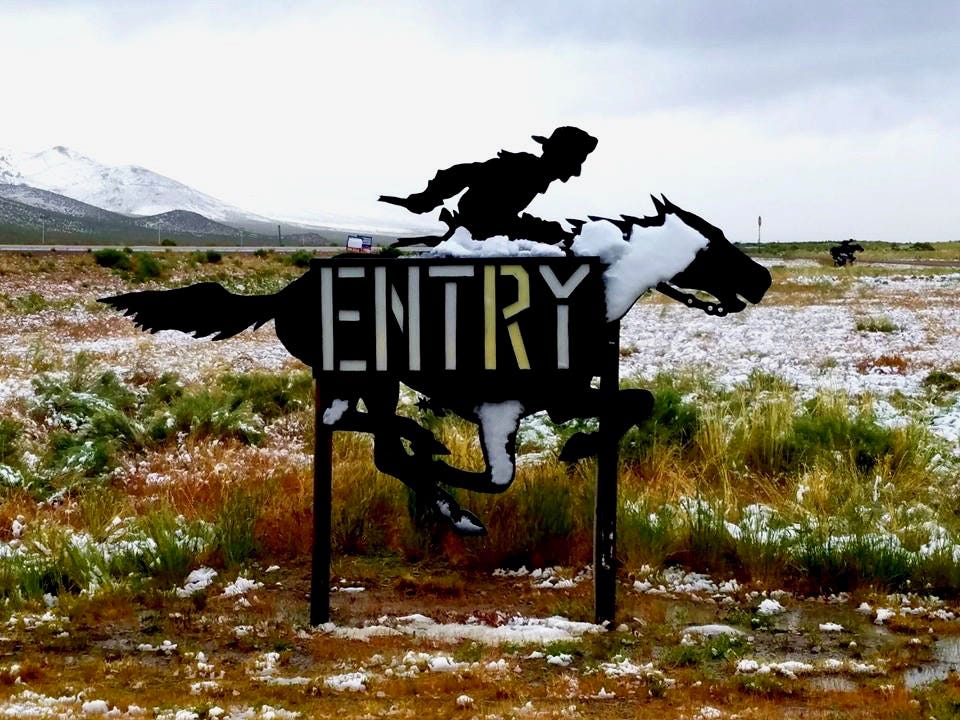


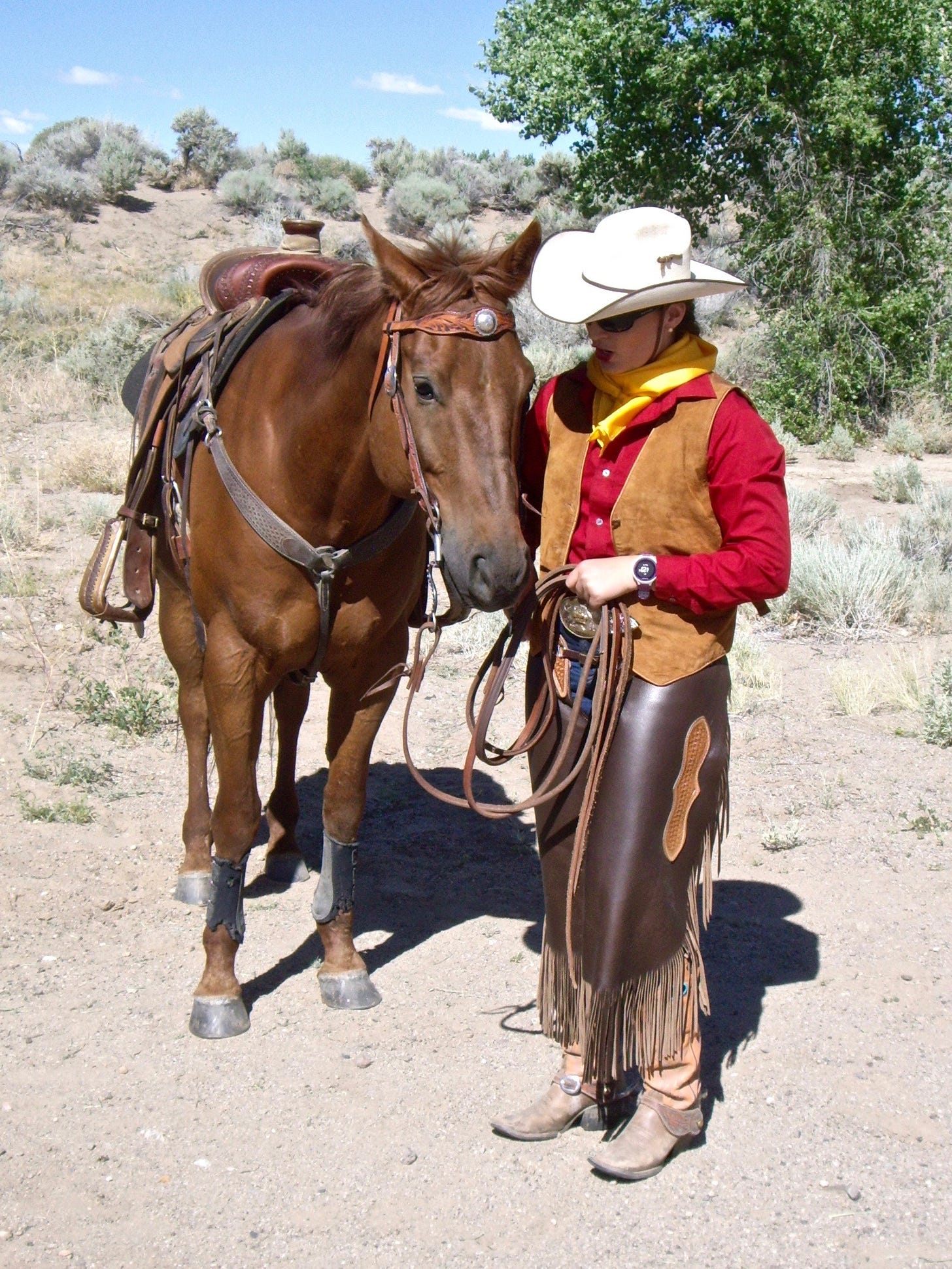

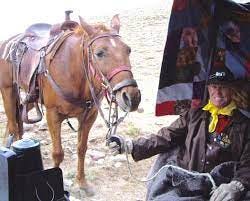
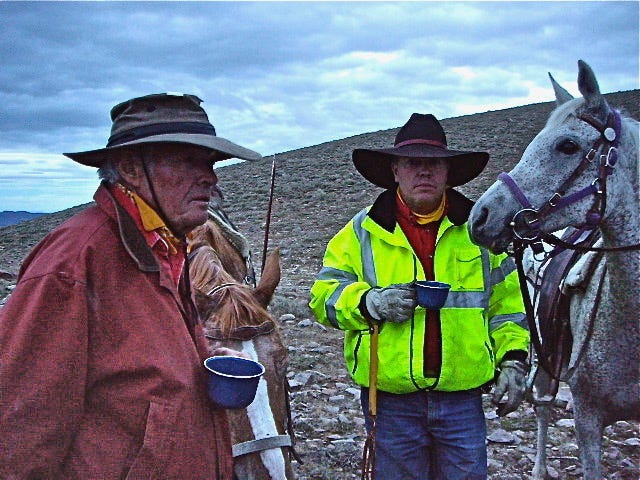
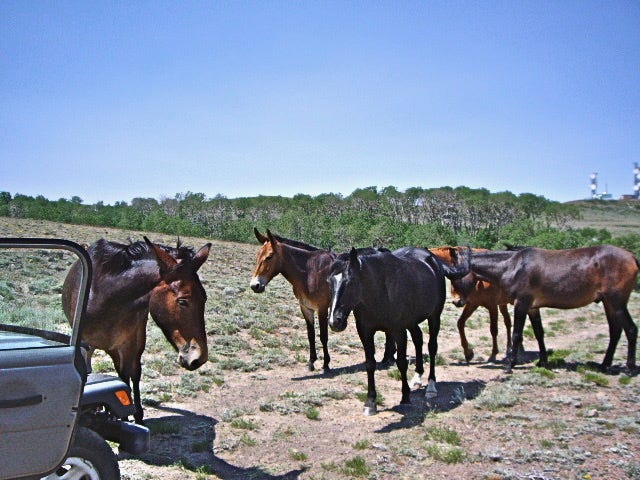
Hon, thank you for writing this. It brings back a lot of memories.